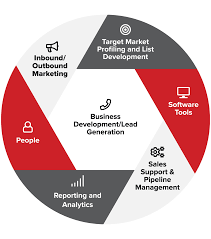Enhancing Business Operations Through Strategic IT Consulting
The Role of Business and IT Consulting in Today’s Digital Landscape
In today’s fast-paced and ever-evolving business environment, the integration of technology has become crucial for organizations to stay competitive and innovative. This is where the role of business and IT consulting comes into play.
Business and IT consulting firms offer specialized services to help businesses effectively utilize technology to achieve their strategic goals. These consultants bring a wealth of knowledge and expertise in both business operations and information technology, making them valuable partners for companies looking to optimize their processes.
Key Benefits of Business and IT Consulting:
- Strategic Planning: Consultants work closely with businesses to develop comprehensive IT strategies aligned with their overall business objectives.
- Process Optimization: They identify inefficiencies in current processes and recommend solutions that leverage technology to streamline operations.
- Technology Implementation: Consultants assist in selecting and implementing the right technology solutions that best fit the organization’s needs.
- Cybersecurity: They help businesses enhance their cybersecurity measures to protect sensitive data from cyber threats.
- Data Analytics: Consultants use data analytics tools to derive valuable insights that drive informed decision-making within the organization.
The Evolving Role of Business and IT Consultants:
As technology continues to advance rapidly, the role of business and IT consultants is evolving as well. Consultants now focus not only on implementing technology solutions but also on driving digital transformation within organizations. They help businesses adapt to changing market trends, embrace innovation, and stay ahead of the competition.
In conclusion, business and IT consulting play a vital role in helping businesses navigate the complexities of today’s digital landscape. By partnering with experienced consultants, organizations can harness the power of technology to drive growth, improve efficiency, and achieve long-term success.
Understanding Business and IT Consulting: Answers to 7 Common Questions
- What is business and consulting?
- What are the Big 4 IT consulting firms?
- What does an IT consulting business do?
- Are IT consultants well paid?
- What does a technology business consultant do?
- What does an IT consultant do for a small business?
- What does consultant do in a IT company?
What is business and consulting?
Business and IT consulting is a specialized service that combines expertise in business operations and information technology to help organizations optimize their processes and achieve their strategic goals. Consultants in this field work closely with businesses to develop tailored IT strategies, identify inefficiencies in current processes, recommend technology solutions, enhance cybersecurity measures, and leverage data analytics for informed decision-making. By partnering with business and IT consultants, companies can adapt to technological advancements, drive digital transformation, and stay competitive in today’s rapidly evolving business landscape.
What are the Big 4 IT consulting firms?
The Big 4 IT consulting firms refer to the leading global professional services firms that offer a wide range of IT consulting services to businesses worldwide. These firms, namely Deloitte, PricewaterhouseCoopers (PwC), Ernst & Young (EY), and KPMG, are renowned for their expertise in providing strategic IT solutions, digital transformation services, cybersecurity consulting, and more. With their vast resources, industry knowledge, and innovative approaches, the Big 4 IT consulting firms have established themselves as trusted partners for organizations seeking top-tier consulting services to navigate the complexities of the modern digital landscape.
What does an IT consulting business do?
An IT consulting business specializes in providing expert advice and services related to information technology to help organizations optimize their IT infrastructure and operations. These businesses offer a wide range of services, including IT strategy development, software implementation, network design, cybersecurity assessments, and technology training. IT consulting firms work closely with clients to understand their unique needs and challenges, offering tailored solutions to enhance efficiency, security, and overall performance within the organization. By leveraging their expertise in technology and business operations, IT consulting businesses play a crucial role in helping companies navigate the complexities of the digital landscape and achieve their strategic goals.
Are IT consultants well paid?
The compensation for IT consultants can vary based on factors such as experience, expertise, industry demand, and geographic location. Generally, IT consultants are well paid due to their specialized skills and the critical role they play in helping businesses leverage technology effectively. Experienced IT consultants with in-demand skills often command higher salaries or hourly rates. Additionally, consultants who offer niche services or work with high-profile clients may earn above-average compensation. Overall, the potential for lucrative pay in the field of IT consulting is significant for those who bring value and expertise to their clients.
What does a technology business consultant do?
A technology business consultant plays a crucial role in helping organizations leverage technology to achieve their business objectives. These consultants provide expert guidance on how to strategically integrate and optimize technology solutions within the company’s operations. They assess the organization’s current IT infrastructure, identify areas for improvement, and recommend tailored strategies to enhance efficiency, productivity, and profitability. Additionally, technology business consultants stay abreast of the latest industry trends and advancements to ensure that their clients remain competitive in the ever-evolving digital landscape.
What does an IT consultant do for a small business?
An IT consultant plays a crucial role in assisting small businesses with their technology needs. They provide tailored solutions and expert guidance to help optimize the use of technology within the organization. An IT consultant for a small business may assess the current IT infrastructure, identify areas for improvement, recommend and implement cost-effective solutions, provide cybersecurity measures to protect data, offer technical support and training to staff, and ensure that the technology aligns with the business goals. Ultimately, an IT consultant helps small businesses leverage technology effectively to enhance productivity, streamline operations, and stay competitive in today’s digital landscape.
What does consultant do in a IT company?
In an IT company, consultants play a crucial role in providing expert guidance and support to optimize the company’s technology infrastructure and operations. Consultants work closely with the company’s IT team to assess current systems, identify areas for improvement, and recommend strategic solutions to enhance efficiency and productivity. They may be involved in various tasks such as system analysis, software development, network management, cybersecurity assessment, and technology implementation. Consultants bring specialized knowledge and experience to address complex IT challenges and help the company leverage technology effectively to achieve its business objectives.







